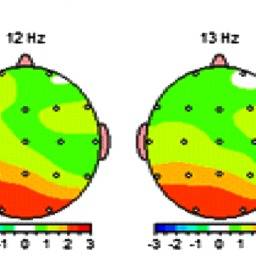Abstract
The brain is equipped with a complex system for processing sensory information, including retinal circuitry comprising part of the central nervous system. Retinal stimulation can influence brain function via customized eyeglasses at both subcortical and cortical levels. We investigated cortical effects from wearing therapeutic eyeglasses, hypothesizing that they can create measureable changes in electroencephalogram (EEG) tracings. A Z-BellSM test was performed on a participant to select optimal lenses. An EEG measurement was recorded before and after the participant wore the eyeglasses. Equivalent quantitative electroencephalography (QEEG) analyses (statistical analysis on raw EEG recordings) were performed and compared with baseline findings. With glasses on, the participant’s readings were found to be closer to the normed database. The original objective of our investigation was met, and additional findings were revealed. The Z-bellSM test identified lenses to influence neurotypical brain activity, supporting the paradigm that eyeglasses can be utilized as a therapeutic intervention. Also, EEG analysis demonstrated that encephalographic techniques can be used to identify channels through which neuro-optomertric treatments work. This case study’s preliminary exploration illustrates the potential role of QEEG analysis and EEG-derived brain imaging in neuro-optometric research endeavors to affect brain function.
Keywords: neurophotonics, brain mapping, visual system, sensory disorders, signal processing, neuro-optometry
Authors: Deborah Zelinsky, Corey FeinbergAI Summary
This article investigates how customized eyeglasses can influence brain function by altering retinal stimulation. The study involved a participant undergoing the Z-Bell℠ test to select optimal lenses, followed by electroencephalogram (EEG) measurements taken before and after wearing the eyeglasses.
Who is this for?
This study highlights how neuro-optometric rehabilitation can improve brain function by modifying retinal input. It benefits individuals with concussion, migraines, dysautonomia, sensory processing disorders, stroke, PTSD, and learning difficulties. By using EEG analysis, the study supports therapeutic lenses as a tool for neurological rehabilitation. The findings are valuable for neuro-optometrists, neurologists, researchers, and healthcare practitioners treating patients with lingering sensory and cognitive issues. It also provides scientific validation for caregivers seeking alternative treatments for brain-related disorders, emphasizing the connection between vision, sensory processing, and neurological function beyond just visual clarity.
Key Points
Objective: The study examines how customized therapeutic eyeglasses can influence brain function by modifying retinal stimulation.
Methodology:
A single participant was assessed using the Z-Bell℠ Test, a neuro-optometric tool for selecting lenses that optimize sensory integration.
EEG (electroencephalogram) readings were recorded before and after wearing the prescribed glasses to measure changes in brain activity.
Findings
The EEG data showed that with the therapeutic glasses, the participant’s brain activity became more normalized, aligning more closely with standard neurological patterns.
This suggests that retinal stimulation through specialized lenses can modulate brain function, supporting the Mind-Eye Institute’s approach.
Implications
The study provides quantifiable evidence that therapeutic eyeglasses can impact brain function beyond just improving eyesight.
It highlights the potential of EEG analysis in evaluating neuro-optometric treatments for individuals with neurological dysfunctions.
Real Patient Application
In the weeks and months following Kristie's first Mind-Eye appointment in late spring 2023, “I began noticing positive changes. I was better able to process words – not stuttering every sixth or seventh word when talking. I no longer had the underlying, annoying headache that had plagued me for more than a year. And my eyes were more relaxed when I worked; I was not so fatigued.”
Interested in learning more?
At the Mind-Eye Institute we understand that interactions between the electrical and biochemical pathways in the brain affect physical, physiological and psychological systems. Visual interventions that alter retinal signaling pathways impact both the electrical and biochemical systems.
To learn about next steps for registering as a patient or registering a child as a patient, please call the Mind-Eye Institute office at 847.558.7817 or you can fill out our online New Patient Inquiry Form provided here.


